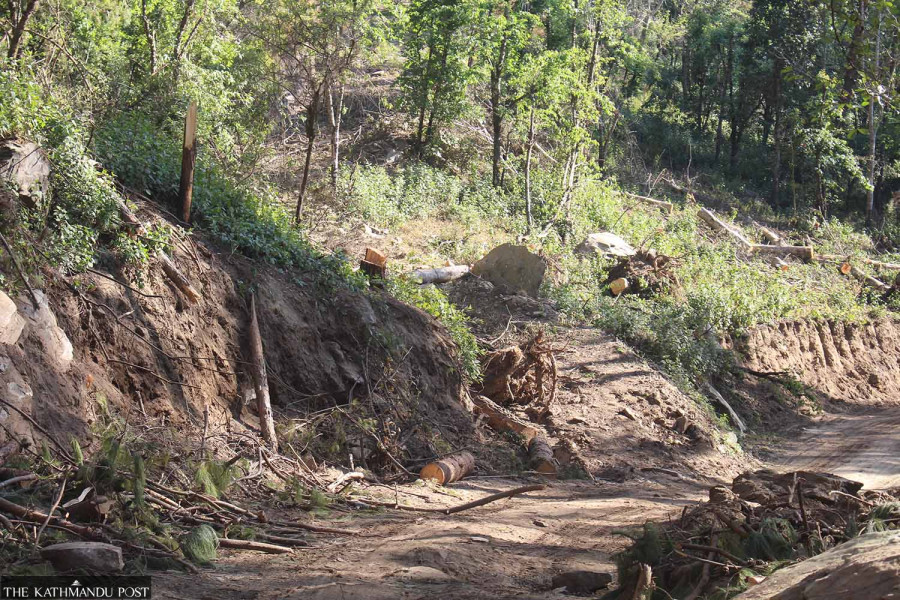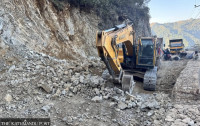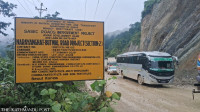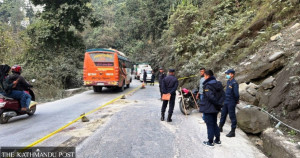Lumbini Province
Unplanned infrastructure development in Gulmi takes toll on environment
Roads are built without assessing their impact on the environment, leading to landslides and drying up of water sources.
Gaganshila Khadka
Unplanned development activities and road connectivity projects initiated by the local governments in Gulmi, a hill district of Lumbini Province, have led to environmental degradation.
After the local level elections in 2017, all 12 local units in Gulmi prioritised road construction in their annual budgets. Thousands of trees were cut down to build roads using heavy machinery.
According to the data available at the local units, a total of 28,518 trees were felled while constructing roads in the district in the past five years.
Most of the rural roads funded by the local government were constructed without conducting environmental impact assessments. Deforestation for road projects has resulted in landslides and the drying up of natural sources of water in the district.
Resunga Municipality, where the district headquarters of Gulmi is located, constructed several road stretches including Tamghas-Palalmi, Tamghas-Resunga, Garjura-Bhadgaun, Pandehelpokhara-Banjhapokhari and a ring road around the municipality in the past five years. Correspondingly, the water sources in the area have been drying up at a fast pace in the last couple of years.
According to the municipal office, the natural water sources at Kholtepani, Pandherathari, Chhaharakhola, Rolkhola, Changkhola, Balkate, Upallopani and Attarkanda, among other places, have dried up in recent years due to haphazard road construction and excessive use of heavy machinery in the fragile topography.
“Residents of Bhadgaun settlement at Resunga-3 and Attarkanda and Balkate settlements are reeling under acute shortage of drinking water as all water sources have dried up due to the unplanned road construction projects. The villagers, especially women, are hardest hit by the water crisis,” said Laxmi Kunwar of Resunga-3.
Women are traditionally responsible for managing water for the household in rural areas.
“The women in the affected villages have to walk for miles to fetch water after natural water springs in their settlement dried up. They are also struggling to collect firewood and fodder due to rampant deforestation in the area,” said Batukrishna Uprety, an advocate specialising in environmental law. “The government has failed to implement laws effectively to conserve the environment.”
As per the data made available to the Post, around 200 natural water sources dried up in the district in the past few years.
Padam Prasad Aryal, the spokesperson of Resunga Municipality, admitted that the municipality cut down thousands of trees while constructing around a dozen roads without carrying out an environmental impact assessment.
A recent study by the International Centre for Integrated Mountain Development and Nepal Water Conservation Foundation shows that natural water sources are drying up and shifting in various places of Nepal due to the unplanned construction of roads and buildings.
While studying the water sources in 300 local units of hill and mountain regions of Nepal, the study found that water sources dried up in around 74 percent of local bodies and water sources shifted to other places in around 58 percent of the local units.
The use of dozers and excavators while constructing roads has also led to frequent landslides in the district. The haphazard dumping of soil and stones during road construction has further exposed the settlements to flooding and landslides.
According to the District Police Office in Gulmi, a total of 2,968 landslides occurred, mainly due to haphazard road construction, across the district in the past four years, destroying 247 houses and 165 animal sheds. As many as 36 people and 210 domesticated animals were killed by landslides during the same time period.
The landslides have also swept away hectares of cultivable land in the district. Around 20 ropanis of land belonging to seven households at Bhadgaun in Resunga-3 were buried as rainwater swept away soil and stones dumped while constructing roads in the area.
“We used to grow paddy, wheat, maize and other legumes and rear animals in our four ropanis of land. Now we have to work in other people’s fields after the mudslides buried our land,” said Krishna Kumari Kunwar of Resunga-3.
As many as 9,249 trees were cut down while constructing roads in Dhurkot Rural Municipality in the past five years. The rural municipal office, however, claims that it tried its best to minimise environmental degradation while constructing roads and other development infrastructure in the local unit.
“Roads are an important infrastructure of development. It is essential for the economic development of rural areas and transportation of local products to the markets. That is why we have prioritised road construction projects,” said Bhupal Pokharel, the chairman of the municipality. “The municipality has focused on minimising the impact of development projects on the environment and controlling soil erosion while constructing roads.”




 20.12°C Kathmandu
20.12°C Kathmandu










